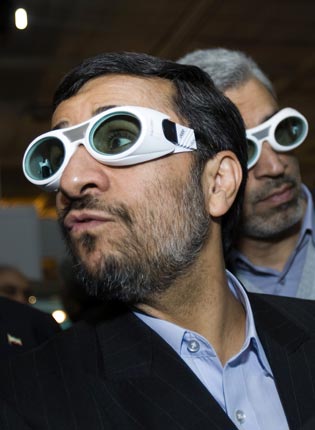Iranian leader tells nuclear chief to step up enrichment
Televised request by Ahmadinejad raises fresh fears over Tehran's uranium intentions

President Mahmoud Ahmadinejad has raised the stakes once more in Iran's nuclear stand-off with the West, publicly instructing his officials on state television to start upgrading the country's stockpiles of uranium to a 20 per cent enrichment level.
Officials said they would start the work tomorrow. The British Foreign Office swiftly issued a statement warning that were Iran to take such action it would instantly be in additional violation of five United Nations Security Council resolutions.
Only days ago, Iran's President was quoted as saying that he was ready to accept the broad terms of a truce that was ostensibly agreed in Geneva last October but never followed through by Tehran. Under that proposal, the country would hand over a large portion of its uranium stockpile to foreign countries, which would later return it in the form of rods suitable for use in a civilian nuclear reactor.
But any faint whiff of diplomatic encouragement that had been in the air evaporated with yesterday's theatrical flourish from President Ahmadinejad. Presiding at a televised meeting attended by the head of Iran's atomic energy agency, Ali Akbar Salehi, the President turned to him and ordered: "Mr Salehi, begin production of 20 per cent."
"We will hand over an official letter to the International Atomic Energy Agency tomorrow, informing the agency that we will start making 20 per cent enriched fuel from Tuesday," Mr Salehi later told Iran's Arabic-language state television station, al-Alam. The drama in Tehran coincided with a warning from Germany to Iran that "patience is at an end".
"It may be that the sanctions screw needs to be, or can be, turned here and there," the German Defence Minister, Karl-Theodor zu Guttenberg, said. "We need to consider very carefully what impact our options could have."
Washington wants to move towards a fourth round of sanctions. But before they can be set forth in a new resolution for passage in the Security Council, agreement on their form and substance must be reached by the so-called "E3 plus 3" countries: Germany, France, and Britain plus the US, China and Russia. China has shown signs of dragging behind the others in seeing sanctions as a useful tool in the dispute.
Robert Gates, US Defence Secretary, on a tour of Europe, urged the world to unite to put pressure on Iran. "If the international community will stand together and bring pressure ... I believe there is still time for sanctions to work," he said in Rome.
Iran currently enriches uranium to a level of about 3.5 per cent. Under the Geneva deal, the United States, China and other major powers have proposed that Iran send most of its low-enriched uranium abroad in return for nuclear fuel refined to a level of 20 per cent, for use in the Tehran reactor. While Iran says it wants the uranium to fuel a medical research reactor, the West continues to suspect that it is pursing a nuclear arms capability. Those fears will inevitably be sharpened by any move by Iran towards independently increasing levels of enrichment.
Mr Ahmadinejad went so far as to suggest that it is the West that has been dragging its heels on reaching an agreement. "We gave them two-to-three months' time for such a deal. They started a new game, and now I [ask] Dr Salehi to start work on the production of 20 per cent fuel using centrifuges," he said.
He did temper his comments slightly by adding that "the doors for interaction are still open".
While raising enrichment levels to 20 per cent would leave a wide gap before the 90 per cent level required to create material appropriate for a nuclear warhead is reached, experts pointed out that the work required to raise it that extra 70 per cent is far less than to get to 20 per cent.
"It would be going most of the rest of the way to weapon-grade material," commented David Albright, a former UN weapons inspector who founded the Washington-based Institute for Science and International Security.
Separately, Iran said it has arrested seven men allegedly linked to the US-funded Radio Farda, which broadcasts into the country, accusing them of working for US spy agencies.
Join our commenting forum
Join thought-provoking conversations, follow other Independent readers and see their replies
Comments
Bookmark popover
Removed from bookmarks